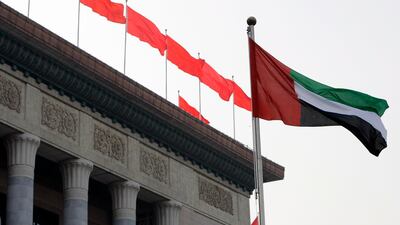The UAE has signed further agreements with China to increase ties with its second-largest trading partner.
The two sides agreed to expand joint efforts in 13 sectors including trade, investment, industry, energy, SMEs, health, education, tourism, infrastructure, finance and aviation. “The UAE and China enjoy strong relations based on friendship, mutual respect and common interests,” said Said Sultan Al Mansoori, the UAE Economy Minister.
Three memorandums of understanding signed on Sunday were: SMEs and innovation; trade; and bilateral investment. In addition, protocols were signed for five-year action plans for mutual business visits with China’s commerce ministry.
Non-oil trade between the two countries stood at US$46.3 billion last year. The UAE’s investments in China were more than $2.1bn last year, including an aviation scheme that covered more than 75 flights a week to major Chinese cities.
Mr Al Mansoori said Chinese companies remain highly interested in the UAE markets because of its unique business environment, which is being further heightened by preparations for Expo 2020 and strategic projects in infrastructure, transport and other major fields.
_______________________
Read more:
Adnoc awards China’s CNPC 8 per cent of Adco concession
Abu Dhabi plant to produce region’s cheapest electricity from solar
_______________________
A Dh1.35bn investment to create the China-UAE food industrial cluster was signed on Saturday between Dubai Food Park and Ningxia Forward Fund Management, consolidating Chinese food production in the Middle East food sector.
Mr Al Mansoori added that these policies and economic development initiatives have a lot in common with China's economic ambitions, especially the broad development initiative “One Belt, One Road”, which was announced last year.
Zhong Shan, China’s commerce minister, said the UAE was an important link to the globalisation plan, in which China is committing $113bn in funding, encouraging other countries to follow suit.
Increasing ties to the region is a necessity for China, as it relies on the GCC to help supply most of its energy imports. Since 2014, Arab countries have signed more than $50bn in contracts with China. Opec member countries help to supply 57 per cent of China’s 7.6 million barrels per day of crude oil imports last year, according to the US Energy Information Administration.
China has also seen its companies growing involvement in the UAE’s energy sector, such as the state-owned China National Petroleum Corporation scooping up a $1.77bn deal to join Abu Dhabi’s onshore oilfield concession with an 8 per cent stake. In addition, Jinko was a part of the consortium that won the 1.17 gigawatt solar project in Abu Dhabi’s Sweihan.
The South East Asian country also made its rounds signing $70bn in new deals to strengthen economic ties with Saudi Arabia, according to Saud Arabian news agency SPA. The Saudi Arabian general investment authority governor Ibrahim Al Omar said that the investment licences for four Chinese companies with a capital of more than 190 million Saudi riyals (Dh186m) reflected the efforts by authorities to ease licensing to improve the investment environment and facilitate the practice of business in the kingdom.

